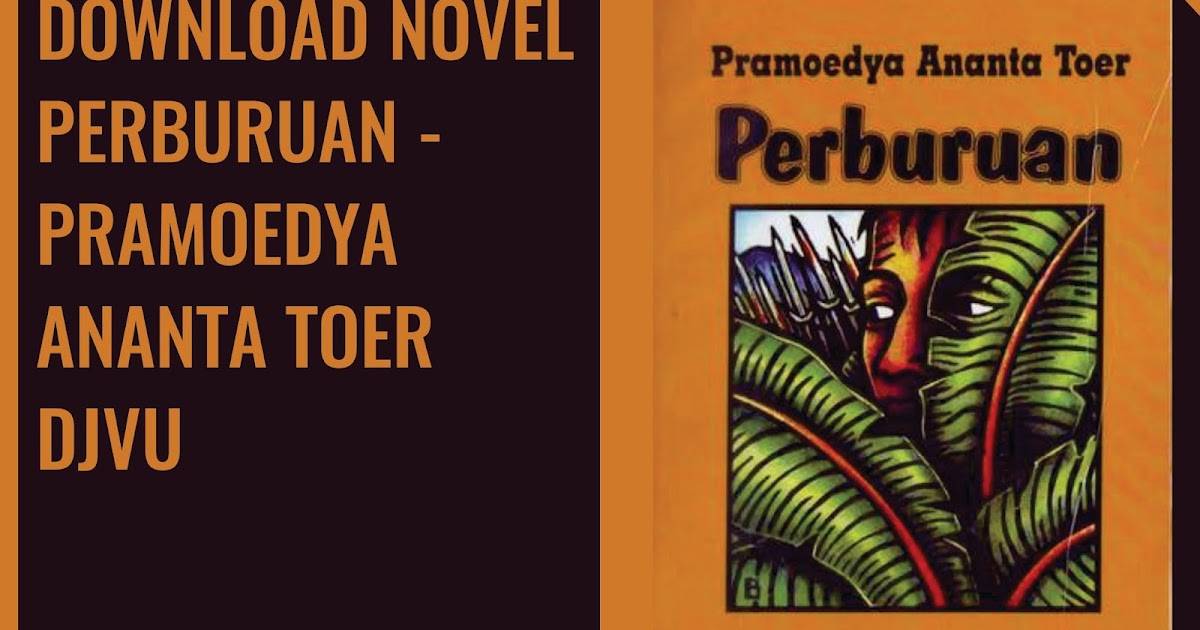Download Buku Pramoedya Ananta Toer Pdf

Download novel Jejak langkah menjadi buku selanjutnya yang akan saya ulas dan saya sediakan link Download Ebook Jejak langkah PDf karya pramudya ananta toer. DOWNLOAD EBOOK JEJAK LANGKAH PDF PRAMOEDYA ANANTA TOER. CARA DOWNLOAD FILE DI BAKASURA. Free download or read online Bumi Manusia pdf (ePUB) book. The first edition of the novel was published in 1975, and was written by Pramoedya Ananta Toer. The book was published in multiple languages including Indonesian, consists of 535 pages and is available in Paperback format. The main characters of this fiction, historical story are Minke, Nyai Ontosoroh.
Pramoedya Ananta Toer, 1950sBorn( 1925-02-06)6 February 1925,Died30 April 2006 (2006-04-30) (aged 81),Occupation,NationalityCitizenshipNotable worksSignaturePramoedya Ananta Toer (: Pramudya Ananta Tur) (6 February 1925 – 30 April 2006) was an author of novels, short stories, essays, and histories of his homeland and its people. His works span the colonial period under rule, Indonesia's struggle for independence, its occupation by Japan during the, as well as the post-colonial authoritarian regimes of and, and are infused with personal and national history. He was imprisoned under the Dutch government from 1947 to 1949, and again under the regime from 1965 to 1979.Pramoedya's writings sometimes fell out of favour with the colonial and later the native governments in power. He faced in Indonesia during the pre- era even though he was well-known outside Indonesia. The Dutch imprisoned him from 1947 to 1949 during the War of Independence (1945-1949).
During the, he was caught up in the shifting tides of political change and power struggles. Suharto had him imprisoned from 1969 to 1979 on the Maluku island of Buru and branded him a Communist.
He was seen as a holdover from the previous regime, despite having struggled with the Sukarno regime). It was on the Island of that he composed his most famous work, the. Not permitted access to writing materials, he recited the story orally to other prisoners before it was written down and smuggled out.Pramoedya opposed some policies of founding President as well as the New Order regime of, Sukarno's successor. Political criticisms were often subtle in his writing, although he was outspoken against colonialism, racism and corruption of the Indonesian new government. During the many years in which he suffered imprisonment and house arrest (in Jakarta after his imprisonment on Buru), he became a for advocates of human rights and freedom of expression.
Contents.Early years Pramoedya was born on 6 February 1925, in the town of in the heartland of, then a part of the. He was the firstborn son in his family; his father was a teacher, who was also active in Boedi Oetomo (the first recognized indigenous national organization in Indonesia) and his mother was a rice trader.
His maternal grandfather had taken the pilgrimage to. As it is written in his semi-autobiographical collection of short stories 'Cerita Dari Blora', his name was originally Pramoedya Ananta Mastoer. However, he felt that the family name Mastoer (his father's name) seemed too aristocratic. The Javanese prefix 'Mas' refers to a man of the higher rank in a noble family. Consequently, he omitted 'Mas' and kept Toer as his family name. He went on to the Radio Vocational School in but had barely graduated from the school when Japan invaded Surabaya (1942).During, Pramoedya (like many Indonesian Nationalists, and among them) at first supported the occupying forces of.
He believed the Japanese to be the lesser of two evils, compared to the Dutch. He worked as a typist for a Japanese newspaper in. As the war went on, however, Indonesians were dismayed by the austerity of wartime and by increasingly harsh measures taken by the Japanese military. The Nationalist forces loyal to switched their support to the incoming Allies against Japan; all indications are that Pramoedya did as well.On 17 August 1945, after the news of reached Indonesia, Sukarno. This touched off the against the forces of the British and Dutch. In this war, Pramoedya joined a paramilitary group in Karawang, Kranji (West Java) and eventually was stationed in. During this time he wrote short stories and books, as well as propaganda for the Nationalist cause.
He was eventually imprisoned by the Dutch in Jakarta in 1947 and remained there until 1949, the year the Netherlands recognised Indonesian independence. While imprisoned in Bukit Duri from 1947 to 1949 for his role in the Indonesian Revolution, he wrote his first major novel The Fugitive.Post-Independence prominence In the first years after the struggle for independence, Pramoedya wrote several works of fiction dealing with the problems of the newly founded nation, as well as semi-autobiographical works based on his wartime memoirs. He was soon able to live in the Netherlands as part of a cultural exchange program.
In the years that followed, he took an interest in several other cultural exchanges, including trips to the and the, as well as translations of Russian writers and.In Indonesia, Pramoedya built up a reputation as a literary and social critic, joining the left-wing writers' group and writing in various newspapers and literary journals. His writing style became more politically charged, as evidenced in his story Korupsi ( Corruption), a critical fiction of a civil servant who falls into the trap of corruption. This created friction between him and the government of.From the late 1950s, Pramoedya began teaching literary history at the Universitas Res Publica. As he prepared material, he began to realise that the study of Indonesian language and literature had been distorted by the Dutch colonial authorities. He sought out materials that had been ignored by colonial educational institutions, and which had continued to be ignored after independence.Having spent time in China, he became greatly sympathetic to the over the persecutions they faced in post-colonial Indonesia. Most notably, he published a series of letters addressed to an imaginary Chinese correspondent discussing the history of the Indonesian Chinese, called Hoakiau di Indonesia.
He criticised the government for being too centred on Java and insensitive to the needs and desires of the other regions and peoples of Indonesia. As a result, he was arrested by the Indonesian military and jailed at for nine months.Imprisonment under Suharto In an October 1965 coup, the army took power after alleging that the was masterminded by the (PKI). The followed, and Pramoedya's position as the head of People's Cultural Organisation, a literary group with connections to the PKI, caused him to be considered a communist and enemy of the 'New Order' regime. During the violent, he was arrested, beaten, and imprisoned by Suharto's government and named a tapol ('political prisoner').
His books were banned from circulation, and he was imprisoned without trial, first in off the southern coast of Java, and then in the penal colony of in the eastern islands of the Indonesian archipelago.He was banned from writing during his imprisonment on the island of Buru but still managed to compose - orally - his best-known series of work to date, the, a series of four novels chronicling the development of Indonesian nationalism and based in part on his own experiences growing up. The English titles of the books in the are,. The main character of the series, Minke, a Javanese minor royal, was based in part on an Indonesian journalist active in the nationalist movement,.The quartet includes strong female characters of Indonesian and Chinese ethnicity and addresses the discrimination and indignities of living under colonial rule, and the struggle for personal and national political independence. Like much of Pramoedya's work, it tells personal stories and focuses on individuals caught up in the tide of a nation's history.Pramoedya had researched for the books before his imprisonment in the prison camp.
When he was arrested, his library was burned, and much of his collection and early writings were lost. On the island of Buru, he was not permitted even to have a pencil.
Doubting that he would ever be able to write the novels down himself, he narrated them to his fellow prisoners. With the support of the other prisoners who took on extra labour to reduce his workload, Pramoedya was eventually able to write the novels down, and the published works derived their name 'Buru Quartet' from the prison where he produced them. They have been collected and published in English (translated by Max Lane) and, as well as many other languages. Though the work is considered a classic by many outside of Indonesia, the publication was banned in Indonesia, causing one of the most famous of Indonesia's literary works to be mostly unavailable to the country's people whose history it addressed. Copies were scanned by Indonesians abroad and distributed via the Internet to people inside the country.Pramoedya's works on colonial Indonesia recognised the importance of as a vehicle for widespread opposition to the Dutch, but his works are not overtly religious. He rejected those who used religion to deny critical thinking, and on occasion wrote with considerable negativity to the religiously pious.Release and subsequent works Pramoedya was released from imprisonment in 1979 but remained under house arrest in Jakarta until 1992. During this time he released The Girl From the Coast, another semi-fictional novel based on his grandmother's own experience (volumes 2 and 3 of this work were destroyed along with his library in 1965).

He also wrote Nyanyi Sunyi Seorang Bisu (1995); A Mute's Soliloquy, an autobiography based on the letters that he wrote for his daughter from imprisonment in Buru but were not allowed to be sent, and Arus Balik (1995). Pramoedya's grave in Karet Bivak Cemetery, JakartaHe wrote many columns and short articles criticising the Indonesian government. He wrote a book Perawan Remaja dalam Cengkeraman Militer ( Young Virgins in the Military's Grip), a documentary written showcasing the plight of Javanese women who were forced to become during the Japanese occupation and were subsequently subject to oppression by their own Indonesian society. The women were brought to Buru where they were sexually abused by the Japanese and ended up staying there instead of returning to Java. Pramoedya's fellow political prisoners were able to meet some of these women (generally only once) and relate this information to Pramoedya, who wrote it down in narrative form in the 1970s, providing the basis for the book published in 2001.Pramoedya was hospitalised on 27 April 2006, for complications brought on by diabetes and heart disease. He was also a heavy smoker of (clove) cigarettes and had endured years of abuse while in detention. Pramoedya earned several accolades and was frequently discussed as Indonesia's and Southeast Asia's best candidate for a.Pramoedya's writings on Indonesia address the international and regional currents caused by political events in history and how these events flowed through his homeland and buffeted its people.
Gogwilt, Chris (1998). 'PRAMOEDYA ANANTA TOER 1925- (INDONESIAN)'. In Schellinger, Paul (ed.). Encyclopedia of the Novel. Chicago, London: Fitzroy Dearborn. Vickers, Adrian (2005). New York: Cambridge University Press.
In figure 3.8, why is the organ demand curve downward-sloping rather than vertical. P. William Bradley Horton, ', Journal of Asia Pacific Studies 14 (2010): 71-88Further reading Books on Pramoedya Ananta Toer. Citra Manusia Indonesia dalam Karya Pramoedya Ananta Toer, by, Pustaka Jaya, 1997.
(in Indonesian). , by, Gramedia Pustaka Utama, 2006. (in Indonesian). Exile: Pramoedya Ananta Toer in conversation with Andre Vltchek and Rossie Indira (Chicago, Ill.: Haymarket Books, 2006). (in English)External links. ( Al Jazeera, February 6).
( The New York Times, April 30)., First on the Battlefield, Pramoedya Ananta Toer, by Gig Ryan, The Age, 6 May 2006.